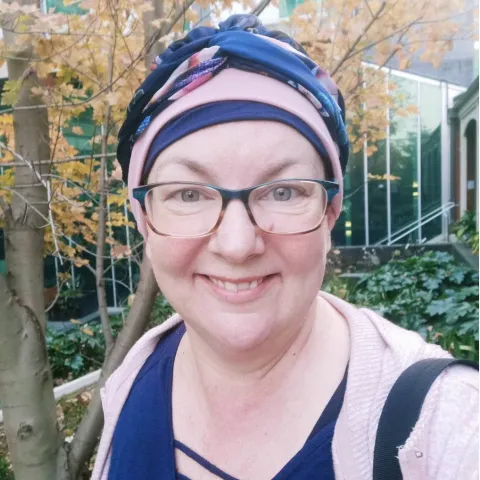
FIONA'S STORY
Fiona, a determined woman from Victoria, never imagined the persistent fatigue and swollen lymph nodes she’d been battling for years were signs of something more serious than just the stresses of single parenting. But at 50, during what she thought was a routine breast scan, her life took a dramatic turn.
A Diagnosis Hidden in Plain Sight
For a decade, Fiona had suspected something wasn’t quite right. She frequently asked doctors about her swollen lymph nodes and unrelenting exhaustion, but the answers were always the same—everything looked normal. Even an ultrasound didn’t raise alarms. It wasn’t until her first breast scan that the truth surfaced.
When she was called back for a second scan, the nurse’s blunt comment—"Oh, you're the one with lymphoma"—sent a shockwave through Fiona. “I hope not!” she replied, only to face a doctor moments later whose horrified expression spoke volumes. Within hours, Fiona was plunged into a whirlwind of appointments and tests, with one phrase haunting her: "It certainly looks like lymphoma, but don’t panic."
Two terrifying thoughts immediately came to mind: My mother died of lymphoma, and I am a single parent of a young child I need to see through to adulthood. “I just needed 10 more years,” she told herself, clinging to hope amidst the uncertainty.
Despite the emotional weight, Fiona found herself grappling with an unusual concern—she was days away from a meticulously planned overseas holiday involving multiple adults’ schedules. With the support of her specialists, who fast-tracked her diagnosis process, Fiona received preliminary confirmation of lymphoma just hours before her flight. Though she travelled with a fresh biopsy wound, she was grateful for the time away to process the news and gather her strength.
Facing Treatment with Determination
Upon returning to Australia, Fiona began her treatment journey with watch-and-wait (W&W), as she showed no B symptoms. But within months, her swollen neck nodes grew to a point where they impacted her sleep and peace of mind. She decided to join the TOP-FLOR clinical trial after consulting with a Lymphoma Australia nurse who provided unbiased, invaluable advice.
The trial involved a combination of three immunotherapy drugs—Golcadomide, Nivolumab, and Rituximab—administered through monthly infusions and tablets. Initially, Fiona thought immunotherapy would be gentler than chemotherapy, but her body had other plans. She endured diarrhea, dry eyes, low iron, hyperthyroidism, dizziness, heart palpitations, a stomach infection, and even unexpected hair loss. Long-term, she lost most of her sense of smell and taste, developed new food intolerances, and faced ongoing gut issues. Her thyroid also became a major problem—she could barely stay upright and lost all her hair before doctors realised her thyroid had gone haywire. Once they prescribed beta blockers, she finally started to recover.
Every scan, cannula, and blood test were complicated and painful. Early on, Fiona was so traumatised by the process that she opted for a PICC line, hoping it would make things easier. Instead, it was painful from day one and remained a constant source of discomfort. Still, it helped her get through treatment without the added stress of needle trauma, allowing her to focus on recovery. By the end of her treatment, Fiona’s energy had returned, and she felt better than she had in a decade. She is now in the maintenance phase, receiving Rituximab every three months with only manageable side effects.
Support That Made a Difference
Throughout her treatment, Fiona leaned on a combination of personal and professional support. Living close to her hospital and receiving parking passes from the clinical trial alleviated logistical burdens. Her new partner became her rock, helping with driving, childcare, and household tasks.
“I had to let go of my independence, but his support proved invaluable,” she said.
Fiona also accessed services through the Olivia Newton-John Cancer Centre, including exercise physiology and massage therapy, which gave her a positive reason to visit the hospital. Maintaining a modified exercise routine during treatment became a source of physical and emotional strength. While she experienced setbacks, such as a mislaid referral for counselling, Fiona appreciated the care and resources available to her.
Fiona’s experience highlights the importance of patient-centered care—a treatment approach that places the patient’s unique needs at the forefront. Fiona found that advocating for herself was one way to ensure her care was tailored to her situation. While the clinical trial required following certain protocols, it was important to her that her concerns were heard, and decisions were made that were right for her.
It’s a reminder that every cancer journey is unique, and care should always be personalised to suit the individual’s needs—emotionally, physically, and socially—to give patients the best possible chance to thrive.
Today, Fiona continues her maintenance treatment with optimism and gratitude. While her experience wasn’t without challenges, she remains hopeful for the future, knowing she’s given herself the best chance to be there for her daughter, be the supportive mum she wants to be, and live life on her own terms.
This story was published with the consent of Lymphoma Australia Association
